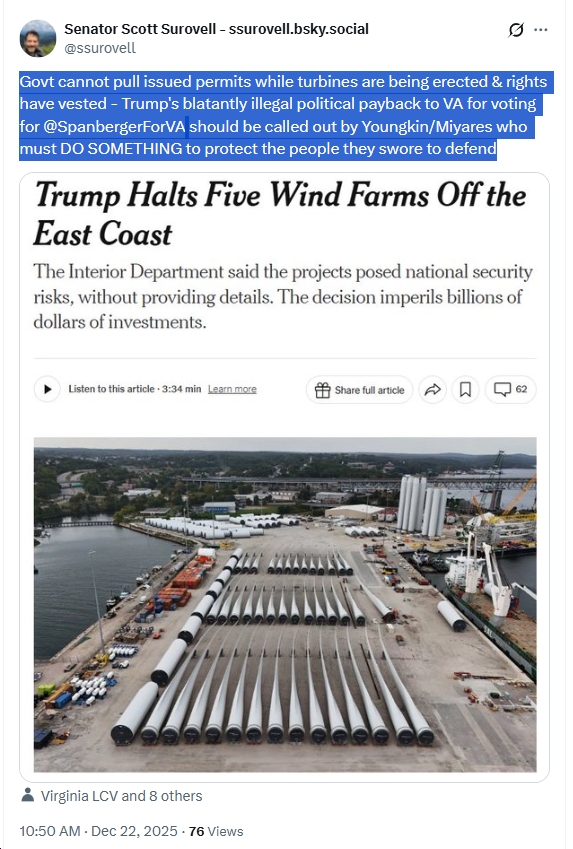Today’s Richmond Times-Dispatch has an interesting article by reporter Patrick Wilson – his first article since May 1st – interestingly, “produced in partnership with the ProPublica Local Reporting Network.” The topic is Dominion Energy, its continued (deleterious, corrosive, corrupting) influence on Virginia politics, and specifically how that (deleterious, corrosive, corrupting) influence played out on the Virginia Clean Economy Act (VCEA). I have a few reactions to this piece, but first, it’s important to state that here at this blog, we supported VCEA – albeit with reservations, as did clean energy advocates like Ivy Main, nearly every environmental group, and the vast majority of Virginia House Democrats (only 2 out of 55 voting against) and Senate Democrats (unanimous). At the time, I wrote that VCEA was “far from perfect, and the process by which it’s been developed has been far too opaque/non-transparent, among other problems,” but that “at this point, the question isn’t between a perfect piece of legislation VCEA; it’s between VCEA and…basically, no other omnibus clean energy legislation.”
Of course, one can ask, how did we end up with a choice between one bill (the VCEA) that made progress but also had serious flaws and…nothing (note: the Virginia Green New Deal bill was mostly aspirational and never had any chance of passage)? It’s an important question, and in my view it gets at a bunch of issues that we’ve talked about on this blog for years, such as:
- The need to professionalize the legislature: that “includes three components: salary, the number of days in a legislative session, and the size of the legislature’s staff”; unfortunately, Virginia doesn’t do very well on any of these three components — low salaries, a legislature that meets just 45 or 60 days per year, and small staffs. Also, crucially, “Lawmakers with less time to spare and no staff to guide them may rely more heavily on lobbyists to advise them about legislation.” Ding ding ding ding ding! In sum, with part-time legislators and small staffs, combined with hundreds of bills to deal with in just a few weeks every year, our legislators are almost inevitably going to end up relying on “friendly” advice from the fine folks at major corporations (e.g., Dominion Power, payday lenders, Altria, coal companies, you name it). Remember, these guys – Dominion lobbyist Bill Murray, etc. – are the “experts” in their specific subject areas, many of which are highly technical, and they will be *happy* to “explain” it to the legislators…from the company’s perspective, of course. Even worse is that many legislators seem to think these lobbyists are their “friends,” even though of course they’re not, and even though of course they’re heavily biased in favor of their own interests, not necessarily the interests of the general public.
- Just to emphasize the previous point, see here for Del. Sally Hudson’s analysis of some of the problems with a “citizen legislature” as opposed to a professionalized legislature: “because we don’t really have a professional legislature that works year-round, what we end up with instead is a professional lobbying core. We end up with a super professional super powerful set of people who do this full time in well-paid gigs and those are the lobbyists. And so it means that it’s just not a fair fight when it comes time for the legislature to work through all of the bills that get put forth by the lobbying corps…think about the math of it; we serve in Richmond during the short years for six weeks…There’s not enough time…you can’t read…3,000 bills in that time. And so… it’s not that you just do less work; the same amount of work gets done, it just gets done by someone who’s less accountable to the people.”
- Along these same lines, check out Adam Siegel’s article, “Virginia Needs a Deep(er) State,” which argues that on the VCEA and other complex legislation: “there is a striking element that comes forth in discussions with firms, elected officials, interest groups, and activists: almost never is a government office pointed to as the key organization providing analytical support to decision-makers and/or the critical information resource. Expertise seems to come, all too often, from interested parties (contributors, businesses, non-profits). This does not seem how government should work.” And, as Adam Siegel correctly argues, there’s a huge amount at stake in some of these bills. For instance, “the Virginia Clean Economy Act (VCEA), with mandates for eliminating carbon emissions within the power (electricity sector) with a renewable portfolio standard (RPS) mandate, energy efficiency requirements, and other elements with decades of interaction and impact on the Virginia economy, billions of dollars at stake, and literally (due to pollution impacts on health) life and death implications.” Also: “Offshore wind (as much as 5.2 gigawatts of capacity) as in the public interest with a potential direct investment implication in excess of ten billion dollars and tens of thousands of jobs.” Why on earth would we leave this to the corporations themselves, and not to a “deep(er) state” – “augmented Virginia government expertise, with a true center for research and expertise to Administrative and legislative requirements while providing more accurate information to government officials, businesses, and citizens?” It’s really crazy…unless you’re a corporation like Dominion, of course, in which case you LOVE it!
- Something else we’ve been arguing for years is that Virginia needs major, serious campaign finance and ethics reforms. Currently, our system is a really, really bad joke…except the joke’s on all of us, certainly not on those – such as Dominion Energy, of course – who benefit from its corruption and pay-to-play model. Unfortunately, we have never had anything close to a critical mass in the legislature for serious, or hell even nibbling-around-the-edges, campaign finance or ethics reform. Republicans, of course, are almost completely hopeless in this regard, as they are basically tools of corporate interests. As for Democrats, we’ve got a bunch of good ones now, but we still don’t have enough to overcome basically unanimous Republican opposition. We also have a Senate Majority Leader who has said, point blank, that he thinks ethics laws are irrelevant and unnecessary, absurdly claiming, “hell, we’ve got laws on the books – bank robbery, murder, armed robbery, embezzlement – and people still do it…because…they don’t know the difference between right and wrong.” And no, it’s not a coincidence that Saslaw has received massive amounts of money from major corporate interests – Dominion, the Virginia Bankers Association, Verizon, etc. – over the years. And then we really expect these folks to vote *against* those very corporate interests? As the saying goes, we may have been born at night, but we weren’t born *last* night!
- As for the RTD article itself, the key point is that Dominion Energy, faced with a serious push for clean energy legislation, responded just as you’d expect it to – by “doubling the size of its lobbying corps and tapping its long-standing relationships with legislative leaders and Gov. Ralph Northam.” The result of which was to make passage of the VCEA more likely, but also to make it more likely that there would be some really bad stuff in the bill, such as massive, inexcusable, and what *should* be unacceptable giveaways to Dominion – for absolutely no good reason, from a public interest point of view. That includes an absurd jacking-up of the cost of Dominion’s offshore wind power project, as well as its rate of return, far above what is justified given the plummeting cost of clean energy in general and of offshore wind power specifically. For instance, check out this CleanTechnica article from earlier this year, which pointed out that “the cost of electricity from Mayflower Wind [offshore project in Massachusetts] will weigh in at just 5.8 cents per kilowatt-hour…the lowest price yet for offshore wind energy in the US.” Also check out this Newsday article, which reports that two offshore wind farms will result in a miniscule charge of just “73 cents more per month over the next 25 years” for “residential ratepayers.” That’s for clean, infinitely renewable power, for the thousands of good-paying jobs that will come with scaling up a U.S. offshore wind power supply chain, for the reduced “negative externalities” such as health costs and adverse climate/enviro impact from fossil fuel pollution, etc. Anyway…why can’t we do this in Virginia as well, instead of artificially cranking up the costs of offshore wind and costing ratepayers a lot more money than they should have to pay? See above, but basically combine a state-protected monopoly utility, essentially no campaign finance or ethics laws, a part-time “citizen legislature” that isn’t professionalized, etc., and that’s what you end up with…
- By the way, it’s crucial to emphasize that in analyzing clean energy projects, one needs to look at the big picture — not just the *cost* of the projects, but also the *benefits* (jobs, reduced pollution, fewer adverse health impacts, etc.). Unfortunately, you’ll see opponents of clean energy frequently referring to costs alone, without mentioning benefits, and without mentioning the enormous costs of sticking with fossil fuels, or the massive taxpayer-funded corporate welfare fossil fuel companies have received over many decades. Also unfortunately, the RTD article doesn’t really get into those benefits, which is misleading and also a missed opportunity to fully inform readers of all that’s at stake here. And, to the extent the article focuses on costs, it almost certainly exaggerates them, citing the questionable “$70 more per month” estimate by the State Corporation Commission, which one Virginia legislator told me this morning is “totally wrong” (the legislator actually used a synonym for “wrong” which rhymes with “mucked up” – lol). Again, given plummeting costs for offshore wind around the world (from $89/megawatthour today to just $51/megawatthour in 2030, etc.), it’s very hard to believe that in 5, 10, 15, 20 years, it’s going to cost ratepayers a ton MORE money for this power – unless we let Dominion get away with price gouging, basically.
- There’s little doubt that – as Del. Lee Carter points out – Dominion Energy is “[addicted] to its monopoly power and to ratepayer money, and they have adapted to Democratic control over the General Assembly,” in this case “price gouging on renewable energy projects…taking advantage of this new majority’s desire to do something for the environment and they are using that as a way to gouge the citizens of this commonwealth.” That, obviously, should not be acceptable to Gov. Northam or to Virginia legislators, who should come back in January 2021 and work on fixing/improving the VCEA. That should include more aggressive (higher, earlier) targets on energy efficiency, solar and offshore wind; as well as reasonable, market rates of return and costs for renewable energy projects. It would also be great if we could get a serious look at more far-reaching options, such as seriously increasing energy competition in Virginia and seriously reining in Dominion, given that this corporation continues to exert far too much influence over the very legislators who are supposed to be regulating it…
P.S. 8th CD Democratic Committee member and progressive activist Matt Royer makes some excellent points here, such as:
“It is the duty of our elected officials to represent the people and to hold big corporations accountable, not to assist in the profiteering of those corporations. That is why they are elected. One thing has become abundantly clear over the past few years, as long as we have those in office willing to play ball with Dominion, especially on things like renewable energy, Virginia will not see the economic justice or the climate justice it so desperately needs. That is what should be in the public interest. We must demand that we have representatives that are unencumbered by this influence we have seen wielded time and time again by Dominion and other corporations. It’s time to keep the big boys honest.”

















